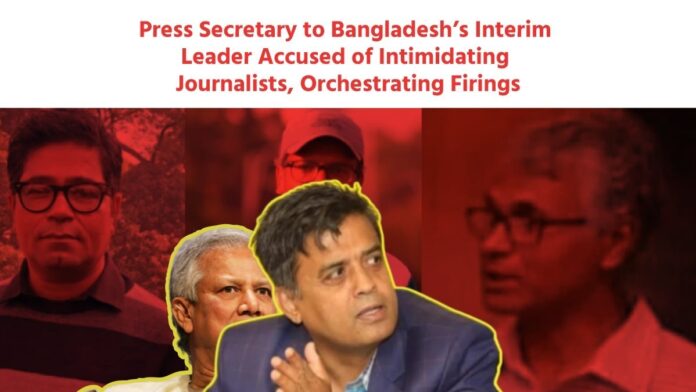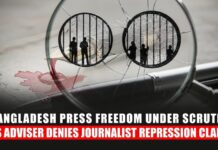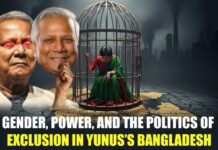
In a troubling pattern of media intimidation, multiple journalists in Bangladesh allege that Shafiqul Alam, Press Secretary to Chief Adviser Dr. Muhammad Yunus, has been directly involved in threatening reporters and pressuring media outlets to fire those who pose challenging questions or publish critical content.
Alam, who has emerged as a central figure in the Yunus administration’s media apparatus, is said to have personally called journalists to warn them against pursuing dissenting narratives. In some instances, he reportedly issued direct instructions to editors to remove reporters from their posts, according to multiple sources familiar with the incidents.
“He’s become a symbol of fear for many of us,” said a senior journalist at a Dhaka-based news outlet, speaking on the condition of anonymity out of concern for professional retaliation. “Just asking a tough question at a press briefing can cost you your job.”
Tensions reached a flashpoint recently when three journalists were dismissed after posing questions at a press conference hosted by Cultural Adviser Mostofa Sarwar Farooki. According to reliable sources within two news organizations, at least two of the terminations were directly ordered by Alam. A third outlet preemptively dismissed its journalist and notified the Press Secretary in an apparent attempt to avoid backlash.
The dismissals are part of a broader wave of crackdowns on the press following the regime change on August 5. After widespread unrest last summer, journalists across nearly all major newsrooms reportedly faced dismissal—particularly those working in the field. Insiders say these actions were orchestrated or facilitated by the press wing now overseen by Alam.
Among the affected outlets is Independent Television, owned by former investment and industry adviser Salman F. Rahman. At least three reporters from the station were terminated in the wake of the political transition. “Two of them were removed following directives from the press wing,” a senior reporter at the channel told BD Digest. “The third, a minority community journalist, was pushed out by BNP-leaning colleagues.”
One journalist from Desh TV recounted being let go shortly after Shafiqul Alam consolidated his influence. “I was working after August 5, but once Alam tightened his grip, my termination became inevitable,” he said.
The wave of firings has disproportionately targeted journalists sympathetic to Bangladesh’s liberation ideals and pro-independence values. Reporters say even mild inquiries at official briefings have triggered threats.
In early April, a veteran journalist attending an investment summit asked about the legitimacy of two foreign “investors” he believed had no real business credentials. “After the press conference, Shafiqul bhai called me and warned me to stop asking such questions. He even insulted me, calling me ignorant,” the journalist said.
The growing climate of fear under Dr. Yunus’s interim government has sparked alarm among press freedom advocates, who warn that Bangladesh’s fragile media environment is being further eroded by a campaign of threats and purges.



